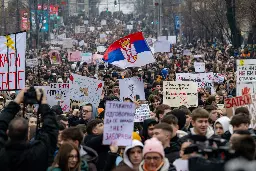It would be a bad idea to follow China ...
U.S.: Trump’s nominee for FBI director Kash Patel made millions consulting for Chinese company notorious for forced labor, now vows to investigate human trafficking, watchdog says
cross-posted from: https://lemmy.sdf.org/post/29144929
> During his Senate Judiciary Committee confirmation hearing, Trump’s nominee for FBI director Kash Patel vowed to investigate human trafficking if confirmed. However, a new review from AccountableUS - a rights group - found Patel has profited millions from a company notorious for the practice. > > At Issue: > - Patel’s financial disclosure revealed he owns between one and five million dollars in Elite Depot Ltd. stock. Elite Depot is the ultimate controlling party of Shein, the Chinese fast fashion realtor. Patel noted that he could participate in matters related to the financial interests of the company if he received a written waiver from Trump. > > - Elite Depot’s board is comprised of Shein executives but also the company’s investors. Two of these investors—IDG Capital and Sequoia Capital—faced scrutiny from lawmakers last year for their reputed ties to the Chinese Communist Party and its military apparatus. > > - In recent years, Shein has drawn bipartisan criticism over their business practices, including the use of forced Uyghur labor. Just this week, the Trump administration considered adding Shein to the Department of Homeland Security’s “forced labor” list. In May 2023, members of Congress asked the SEC to require Shein certify that their products did not use forced Uyghur labor. Throughout 2024, politicians, including former senator and current Secretary of State Marco Rubio, Senator Tom Cotton, and a coalition of state AGs, stated their concerns about Shein’s business practices. > > ...
U.S.: Trump’s nominee for FBI director Kash Patel made millions consulting for Chinese company notorious for forced labor, now vows to investigate human trafficking, watchdog says
During his Senate Judiciary Committee confirmation hearing, Trump’s nominee for FBI director Kash Patel vowed to investigate human trafficking if confirmed. However, a new review from AccountableUS - a rights group - found Patel has profited millions from a company notorious for the practice.
At Issue:
-
Patel’s financial disclosure revealed he owns between one and five million dollars in Elite Depot Ltd. stock. Elite Depot is the ultimate controlling party of Shein, the Chinese fast fashion realtor. Patel noted that he could participate in matters related to the financial interests of the company if he received a written waiver from Trump.
-
Elite Depot’s board is comprised of Shein executives but also the company’s investors. Two of these investors—IDG Capital and Sequoia Capital—faced scrutiny from lawmakers last year for their reputed ties to the Chinese Communist Party and its military apparatus.
-
In recent years, Shein has drawn bipartisan criticism over their business practices, including the use of forced Uyghur labor. Just this week, the Trump administration considered adding Shein to the Department of Homeland Security’s “forced labor” list. In May 2023, members of Congress asked the SEC to require Shein certify that their products did not use forced Uyghur labor. Throughout 2024, politicians, including former senator and current Secretary of State Marco Rubio, Senator Tom Cotton, and a coalition of state AGs, stated their concerns about Shein’s business practices.
...
Schools across Russia establish “special military operation” museums with VR simulations of war-torn Ukraine, report says
At least 12 regions in Russia have set up interactive museums in schools dedicated to the so-called “special military operation” museums in schools, where students participate in quizzes about the war in Ukraine and view battle-damaged buildings through VR headsets, according to a report by the inde...

cross-posted from: https://lemmy.sdf.org/post/29143627
> Archived > > Here is the original version in Russian. > > At least 12 regions in Russia have set up interactive museums in schools dedicated to the so-called “special military operation” museums in schools, where students participate in quizzes about the war in Ukraine and view battle-damaged buildings through VR headsets, according to a report by the independent exiled Russian publication Verstka. > > The IT company “Digital Space” («Цифровое пространство»), which previously developed VR simulators for school subjects such as physics, chemistry, and biology, was behind the software for these exhibits. > > [...] > > These “museums” can operate on regular computers, interactive screens, or VR headsets, depending on the school’s resources. The company’s website states that museums dedicated to the “special military operation” have been installed in schools and youth centers across 12 Russian regions, but social media reports and procurement data suggest that their actual number is growing. > > [...] > > The company's representative, Andrey Chizhov, stated that since 2023, the firm has supplied equipment and software to approximately 250 Russian schools. > > The “museum’s” exhibits include 3D models of weapons and military equipment, video messages from Vladimir Putin, articles on so-called “Nazism in Ukraine,” and a timeline of the war, which concludes with a slide claiming: “Kharkiv is a Russian city, the enemy will be defeated,” with the date listed as “coming soon,” rather than a specific time. > > They also highlight certain “benefits” of taking part in the war — such as reduced interest rates on real estate purchases through Russia’s military mortgage program. > > Students can also use VR headsets for 360-degree virtual tours of exhibits such as a war-damaged house in Siverskodonetsk (known as Sievierodonetsk until 2024) and the interior of captured Ukrainian military equipment. > > The technology also allows school students to complete interactive quests with questions such as “Why did the Russian army withdraw from Snake Island?” and “Which of the following sources can be considered reliable?” — with the following options: independent outlet Meduza, independent outlet Novaya Gazeta, or state-run TASS (with TASS being implied as the “correct” response). > > Meduza and Novaya Gazeta have been highly critical of the Kremlin and have faced severe restrictions in Russia as a result. > > [...] > > [Today, both Meduza and Novaya Gazeta are published from exile. Novaya Gazeta’s editor-in-chief, Dmitry Muratov, received the Nobel Peace Prize in 2021 alongside Maria Ressa, a journalist from the Philippines, for their efforts to safeguard freedom of expression]. > > [...] > > TASS, meanwhile, is a state-owned news agency. It is fully owned and operated by the Russian government and reports directly to the Federal Agency for Press and Mass Communications, which falls under the authority of the Russian Presidential Administration. > > The creation of “special military operation” museums in Russian schools began in the spring of 2023, following a directive from Vladimir Putin. At the same time, Putin ordered that war-related artifacts be transferred to schools across the country for display and that students be educated about the history of the war.
Schools across Russia establish “special military operation” museums with VR simulations of war-torn Ukraine, report says
At least 12 regions in Russia have set up interactive museums in schools dedicated to the so-called “special military operation” museums in schools, where students participate in quizzes about the war in Ukraine and view battle-damaged buildings through VR headsets, according to a report by the inde...

Here is the original version in Russian.
At least 12 regions in Russia have set up interactive museums in schools dedicated to the so-called “special military operation” museums in schools, where students participate in quizzes about the war in Ukraine and view battle-damaged buildings through VR headsets, according to a report by the independent exiled Russian publication Verstka.
The IT company “Digital Space” («Цифровое пространство»), which previously developed VR simulators for school subjects such as physics, chemistry, and biology, was behind the software for these exhibits.
[...]
These “museums” can operate on regular computers, interactive screens, or VR headsets, depending on the school’s resources. The company’s website states that museums dedicated to the “special military operation” have been installed in schools and youth centers across 12 Russian regions, but social media reports and procurement data suggest that their actual number is growing.
[...]
The company's representative, Andrey Chizhov, stated that since 2023, the firm has supplied equipment and software to approximately 250 Russian schools.
The “museum’s” exhibits include 3D models of weapons and military equipment, video messages from Vladimir Putin, articles on so-called “Nazism in Ukraine,” and a timeline of the war, which concludes with a slide claiming: “Kharkiv is a Russian city, the enemy will be defeated,” with the date listed as “coming soon,” rather than a specific time.
They also highlight certain “benefits” of taking part in the war — such as reduced interest rates on real estate purchases through Russia’s military mortgage program.
Students can also use VR headsets for 360-degree virtual tours of exhibits such as a war-damaged house in Siverskodonetsk (known as Sievierodonetsk until 2024) and the interior of captured Ukrainian military equipment.
The technology also allows school students to complete interactive quests with questions such as “Why did the Russian army withdraw from Snake Island?” and “Which of the following sources can be considered reliable?” — with the following options: independent outlet Meduza, independent outlet Novaya Gazeta, or state-run TASS (with TASS being implied as the “correct” response).
Meduza and Novaya Gazeta have been highly critical of the Kremlin and have faced severe restrictions in Russia as a result.
[...]
[Today, both Meduza and Novaya Gazeta are published from exile. Novaya Gazeta’s editor-in-chief, Dmitry Muratov, received the Nobel Peace Prize in 2021 alongside Maria Ressa, a journalist from the Philippines, for their efforts to safeguard freedom of expression].
[...]
TASS, meanwhile, is a state-owned news agency. It is fully owned and operated by the Russian government and reports directly to the Federal Agency for Press and Mass Communications, which falls under the authority of the Russian Presidential Administration.
The creation of “special military operation” museums in Russian schools began in the spring of 2023, following a directive from Vladimir Putin. At the same time, Putin ordered that war-related artifacts be transferred to schools across the country for display and that students be educated about the history of the war.
Activists from WalkFree, an international human rights group that aims to end modern slavery, estimate that roughly 1.9 million people in Russia are being kept in some form of bondage. St. Petersburg alone has hundreds of so-called workhouses, and thousands more are scattered all across the country....

cross-posted from: https://lemmy.sdf.org/post/29141151
> Archived > > Activists from WalkFree, an international human rights group that aims to end modern slavery, estimate that roughly 1.9 million people in Russia are being kept in some form of bondage. St. Petersburg alone has hundreds of so-called workhouses, and thousands more are scattered all across the country. Almost all of them operate illegally, and workers are forced to labor for humiliatingly low wages — or for free. Some of these houses are disguised as religious communities or rehabilitation centers and even receive impressive government contracts. Residents who wish to leave and find a normal job are often severely penalized. Meanwhile, workhouse owners make millions, living lives of luxury. > > ... > > “People in desperate circumstances” > > Illegal advertisements for workhouses pepper walls all over St. Petersburg. The ads promise “help in a difficult life situation”: free housing, food, and most importantly, daily payouts. Such promises appeal mainly to homeless people, migrant workers, victims of fraud, and ex-cons — those who have nowhere else to turn. > > “I'm from Belarus,” Viktor [not his real name] explains. “About six years ago I came to St. Petersburg to earn money. I was in the restoration business, making good money. But I started drinking and using drugs. I got kicked out of work and ended up on the street. I didn't feel like going home. So my friends and I decided to call the number on the business cards.” > > As it turned out, promises of help in workhouses always come with very strict demands. All workhouse residents had to work eight-hour shifts every day at whatever location the workhouse assigned for them. > > ... > > “Like prison” > > Workhouses in St. Petersburg, Moscow, and other large Russian cities are similar to one another. As living quarters, they use detached houses or three-room apartments — and sometimes even basements, according to our homeless interviewees. An average institution houses and employs from 12 to 30 people. “There were bunk beds in the bedrooms, with a distance of about a meter between the beds. Not too cramped, I guess. Like in prison,” Viktor says. > > ... > > How much does a workhouse bring in > > A workhouse is a highly profitable business with minimal costs. The Insider calculates that a ten-strong crew brings the workhouse a net income of nearly $5,000 a month. According to former workers, all managers and CEOs earn enough money to buy apartments and cars rather quickly, and some “invest in the business,” expanding the network of workhouses and opening new branches. > > ...
Activists from WalkFree, an international human rights group that aims to end modern slavery, estimate that roughly 1.9 million people in Russia are being kept in some form of bondage. St. Petersburg alone has hundreds of so-called workhouses, and thousands more are scattered all across the country....

Activists from WalkFree, an international human rights group that aims to end modern slavery, estimate that roughly 1.9 million people in Russia are being kept in some form of bondage. St. Petersburg alone has hundreds of so-called workhouses, and thousands more are scattered all across the country. Almost all of them operate illegally, and workers are forced to labor for humiliatingly low wages — or for free. Some of these houses are disguised as religious communities or rehabilitation centers and even receive impressive government contracts. Residents who wish to leave and find a normal job are often severely penalized. Meanwhile, workhouse owners make millions, living lives of luxury.
...
“People in desperate circumstances”
Illegal advertisements for workhouses pepper walls all over St. Petersburg. The ads promise “help in a difficult life situation”: free housing, food, and most importantly, daily payouts. Such promises appeal mainly to homeless people, migrant workers, victims of fraud, and ex-cons — those who have nowhere else to turn.
“I'm from Belarus,” Viktor [not his real name] explains. “About six years ago I came to St. Petersburg to earn money. I was in the restoration business, making good money. But I started drinking and using drugs. I got kicked out of work and ended up on the street. I didn't feel like going home. So my friends and I decided to call the number on the business cards.”
As it turned out, promises of help in workhouses always come with very strict demands. All workhouse residents had to work eight-hour shifts every day at whatever location the workhouse assigned for them.
...
“Like prison”
Workhouses in St. Petersburg, Moscow, and other large Russian cities are similar to one another. As living quarters, they use detached houses or three-room apartments — and sometimes even basements, according to our homeless interviewees. An average institution houses and employs from 12 to 30 people. “There were bunk beds in the bedrooms, with a distance of about a meter between the beds. Not too cramped, I guess. Like in prison,” Viktor says.
...
How much does a workhouse bring in
A workhouse is a highly profitable business with minimal costs. The Insider calculates that a ten-strong crew brings the workhouse a net income of nearly $5,000 a month. According to former workers, all managers and CEOs earn enough money to buy apartments and cars rather quickly, and some “invest in the business,” expanding the network of workhouses and opening new branches.
...
"Corruption Kills:" How Tragedy Sparked a Protest Movement in Serbia
Serbs from all walks of life have had enough with their corrupt, inept, and increasingly authoritarian government. Will Serbia’s president be able to withstand the crisis?

cross-posted from: https://lemmy.sdf.org/post/29136407
> Serbs are once again taking to the streets to protest the corruption and political dysfunction of President Aleksandar Vučić and his ruling Serbian Progressive Party (SNS) with Prime Minister Miloš Vučević already resigned. > > The demonstrations began after a concrete canopy above the entrance of Novi Sad’s railway station collapsed on November 1, crushing fifteen people in the country’s second-largest city. The station had reopened only in July after undergoing repeated renovations as part of a project to modernize the Belgrade-Budapest railway under China’s Belt and Road Initiative (BRI). > ...
[Edit typo.]
Please be careful when saying things like "half of Austria is a proxy of Russia". We should not pigeonhole half a country.
[Regarding the Wirecard case: You might refer to the former Wirecard CFO Jan Marsalek, who was/is an alleged Russian spy and is now wanted by Western authorities. Former Wirecard CEO Markus Braun has been arrested in 2020 with court cases pending.]
"Corruption Kills:" How Tragedy Sparked a Protest Movement in Serbia
Serbs from all walks of life have had enough with their corrupt, inept, and increasingly authoritarian government. Will Serbia’s president be able to withstand the crisis?

Serbs are once again taking to the streets to protest the corruption and political dysfunction of President Aleksandar Vučić and his ruling Serbian Progressive Party (SNS) with Prime Minister Miloš Vučević already resigned.
The demonstrations began after a concrete canopy above the entrance of Novi Sad’s railway station collapsed on November 1, crushing fifteen people in the country’s second-largest city. The station had reopened only in July after undergoing repeated renovations as part of a project to modernize the Belgrade-Budapest railway under China’s Belt and Road Initiative (BRI). ...
[Edit typo.]
I congratulate you, too :-)
Austria's Raiffeisen Bank International still providing services to Russian war suppliers, new investigation finds
An investigation released by journalists at Bloomberg on Monday has found that Austria’s Raiffeisen Bank International (RBI) maintains client relationships with companies supplying the…

Original article (requires registration).
Austria’s Raiffeisen Bank International (RBI) maintains client relationships with companies supplying the Russian defence sector, revealing previously unknown dimensions of the bank’s involvement in Russia’s war of aggression on Ukraine.
Bloomberg’s investigation shows that Raiffeisen’s Russian subsidiary earned more than $600,000 last year from providing payment and foreign exchange services to companies producing materials for Russian arms manufacturers. One such company, Russian chemical manufacturer Unichim, received payments into a Raiffeisen account after supplying acids for use in missile systems to a sanctioned company with close ties to the Russian navy.
Raiffeisen Bank International has repeatedly stated that it seeks to exit Russia and that its Russian unit has “implemented monitoring and screening tools to comply with… all applicable sanctions”. Bloomberg’s findings, however, underscore that the operational risks for companies still doing business in Russia have become nearly impossible to avoid. After reporting a drop in its annual profits for the first time in nine years following a US$ 2bn asset grab by a Russian court, RBI may now also find itself facing compliance-related risks over its client relationships in Russia.
[...]
30 civil society organizations from Ukraine and abroad had previously raised a similar warning in an open letter to RBI’s CEO Johann Strobl in May 2023, cautioning that “Russia has made it next to impossible for foreign businesses to operate in the country without becoming directly complicit in Russia's war efforts”. The open letter did not receive a response.
[...]
Die chinesischen Investitionen in Spanien scheinen zu wirken, wie Peking das sich vorstellt.
France: Retail giant Decathlon accused of using forced labour in China, deforestation in Brazil, report says
cross-posted from: https://lemmy.sdf.org/post/29128602
> Archived version > > Making innovative garments that are hard-wearing and above all affordable: this is Decathlon’s recipe for success. However, confidential documents obtained by Disclose tell a very different story about the sports retail giant. Child labour, exploited Uyghur workers in China, connections with deforestation in Brazil, etc.: our revelations show that the multinational is prepared to do anything to maximise profits. > > ... > > Although the brand has invested millions not to be typecast as a “low cost” brand, the two words are ubiquitous in internal documents that an internal source shared with Disclose. Low prices are what drives the brand to have most of its garments made by subcontractors. Decathlon has 1,264 subcontractors around the world and only nine production sites of its own. For maximum profitability, the manufacturer looks first and foremost for the cheapest factories, namely those “working for low-price brands involved in mass production,” according to an internal document listing subcontractor selection criteria. One would have thought that such an aggressive commercial strategy was the preserve of Chinese fast fashion giants such as Shein and Temu. > > Its main suppliers are in Asia: in order of importance, in China, Vietnam and Bangladesh. The latter is actually described as a “low cost country” in an internal roadmap. Making garments in the country — where more than half the population live in slums — is a “strength” for Decathlon, according to the same document. In Bangladesh, the group works with suppliers described as “extremely low cost”. They employ adolescents who may legally be paid less than the minimum wage. Other factories in its production chain in the country are described as “clandestine” by a former member of staff. Although they supply up to 10% of the components of a shoe, the brand conducts no audits there, Disclose can reveal in the first part of its investigation. > > ... > > The thirst for profit also lured Decathlon into the arms of other problematic subcontractors in China. The second part of our investigation, published on Thursday 6 February, in partnership with Cash Investigation, reveals that one of its main local partners resorts to the forced labour of Uyghurs, a Muslim minority persecuted by Beijing. Our undercover investigation in two Chinese factories also reveals that Decathlon uses cotton from Xinjiang, the Uyghur home region, where forced labour accusations are rife. > > Our investigation on the multinational with 931 million euros profit in 2023 also took us to Brazil. The third part, published in partnership with Dutch media outlet Follow the Money on Saturday 8 February, looks into the origin of another raw material: the leather that is used to make the famous Quechua walking boots. The factories that assemble them in Vietnam use cattle hides from Brazil at the risk of contributing to eradication of primary forests in the country. > > ...
France: Retail giant Decathlon accused of using forced labour in China, deforestation in Brazil, report says
Making innovative garments that are hard-wearing and above all affordable: this is Decathlon’s recipe for success. However, confidential documents obtained by Disclose tell a very different story about the sports retail giant. Child labour, exploited Uyghur workers in China, connections with deforestation in Brazil, etc.: our revelations show that the multinational is prepared to do anything to maximise profits.
...
Although the brand has invested millions not to be typecast as a “low cost” brand, the two words are ubiquitous in internal documents that an internal source shared with Disclose. Low prices are what drives the brand to have most of its garments made by subcontractors. Decathlon has 1,264 subcontractors around the world and only nine production sites of its own. For maximum profitability, the manufacturer looks first and foremost for the cheapest factories, namely those “working for low-price brands involved in mass production,” according to an internal document listing subcontractor selection criteria. One would have thought that such an aggressive commercial strategy was the preserve of Chinese fast fashion giants such as Shein and Temu.
Its main suppliers are in Asia: in order of importance, in China, Vietnam and Bangladesh. The latter is actually described as a “low cost country” in an internal roadmap. Making garments in the country — where more than half the population live in slums — is a “strength” for Decathlon, according to the same document. In Bangladesh, the group works with suppliers described as “extremely low cost”. They employ adolescents who may legally be paid less than the minimum wage. Other factories in its production chain in the country are described as “clandestine” by a former member of staff. Although they supply up to 10% of the components of a shoe, the brand conducts no audits there, Disclose can reveal in the first part of its investigation.
...
The thirst for profit also lured Decathlon into the arms of other problematic subcontractors in China. The second part of our investigation, published on Thursday 6 February, in partnership with Cash Investigation, reveals that one of its main local partners resorts to the forced labour of Uyghurs, a Muslim minority persecuted by Beijing. Our undercover investigation in two Chinese factories also reveals that Decathlon uses cotton from Xinjiang, the Uyghur home region, where forced labour accusations are rife.
Our investigation on the multinational with 931 million euros profit in 2023 also took us to Brazil. The third part, published in partnership with Dutch media outlet Follow the Money on Saturday 8 February, looks into the origin of another raw material: the leather that is used to make the famous Quechua walking boots. The factories that assemble them in Vietnam use cattle hides from Brazil at the risk of contributing to eradication of primary forests in the country.
...
DeepSeek iOS app sends data unencrypted to ByteDance-controlled servers in China, researchers say
cross-posted from: https://lemmy.sdf.org/post/29128134
> Archived > > A NowSecure mobile application security and privacy assessment has uncovered multiple security and privacy issues in the DeepSeek iOS mobile app that lead us to urge enterprises to prohibit/forbid its usage in their organizations. > > ... > > Key Risks Identified: > > - Unencrypted Data Transmission: The app transmits sensitive data over the internet without encryption, making it vulnerable to interception and manipulation. > - Weak & Hardcoded Encryption Keys: Uses outdated Triple DES encryption, reuses initialization vectors, and hardcodes encryption keys, violating best security practices. > - Insecure Data Storage: Username, password, and encryption keys are stored insecurely, increasing the risk of credential theft. > - Extensive Data Collection & Fingerprinting: The app collects user and device data, which can be used for tracking and de-anonymization. > - Data Sent to China & Governed by PRC Laws: User data is transmitted to servers controlled by ByteDance, raising concerns over government access and compliance risks. > > ... > > How to Mitigate the DeepSeek iOS App Risks > > >It is difficult, if not impossible, at this time to immediately mitigate the numerous security, privacy and data risks that exist in the DeepSeek iOS today. Over time, we hope the security issue will be remediated and that some of the practices impacting privacy could be addressed. But for US and EU based businesses and government agencies, it is difficult to mitigate the storage, analysis and processing of data in the People’s Republic of China. Of course, each organization can make this determination themselves and hopefully the risks outlined above provide insights and a path towards a more secure and secure iOS app. > > In the meantime, there are immediate steps companies and government agencies can take: > > 1. Immediately stop using the DeepSeek iOS app until security and privacy failures are sufficiently mitigated > 2. Determine if the data collection, privacy policy, terms of service and legal jurisdiction are issues that put your organization at risk > 3. Consider leveraging the DeepSeek open source model via hosted solutions from companies like Microsoft or via self-hosting the model (e.g. via Hugging Face) > 4. Investigate alternative AI apps that offer the DeepSeek open source model but with better security, privacy and data governance. Or consider other AI offerings that address your organization’s needs > > ...
DeepSeek iOS app sends data unencrypted to ByteDance-controlled servers in China, researchers say
A NowSecure mobile application security and privacy assessment has uncovered multiple security and privacy issues in the DeepSeek iOS mobile app that lead us to urge enterprises to prohibit/forbid its usage in their organizations.
...
Key Risks Identified:
- Unencrypted Data Transmission: The app transmits sensitive data over the internet without encryption, making it vulnerable to interception and manipulation.
- Weak & Hardcoded Encryption Keys: Uses outdated Triple DES encryption, reuses initialization vectors, and hardcodes encryption keys, violating best security practices.
- Insecure Data Storage: Username, password, and encryption keys are stored insecurely, increasing the risk of credential theft.
- Extensive Data Collection & Fingerprinting: The app collects user and device data, which can be used for tracking and de-anonymization.
- Data Sent to China & Governed by PRC Laws: User data is transmitted to servers controlled by ByteDance, raising concerns over government access and compliance risks.
...
How to Mitigate the DeepSeek iOS App Risks
>It is difficult, if not impossible, at this time to immediately mitigate the numerous security, privacy and data risks that exist in the DeepSeek iOS today. Over time, we hope the security issue will be remediated and that some of the practices impacting privacy could be addressed. But for US and EU based businesses and government agencies, it is difficult to mitigate the storage, analysis and processing of data in the People’s Republic of China. Of course, each organization can make this determination themselves and hopefully the risks outlined above provide insights and a path towards a more secure and secure iOS app.
In the meantime, there are immediate steps companies and government agencies can take:
- Immediately stop using the DeepSeek iOS app until security and privacy failures are sufficiently mitigated
- Determine if the data collection, privacy policy, terms of service and legal jurisdiction are issues that put your organization at risk
- Consider leveraging the DeepSeek open source model via hosted solutions from companies like Microsoft or via self-hosting the model (e.g. via Hugging Face)
- Investigate alternative AI apps that offer the DeepSeek open source model but with better security, privacy and data governance. Or consider other AI offerings that address your organization’s needs
...
China: Internetnutzer sollen künftig eine staatliche Kennnummer verwenden, um sich bei Plattformen anzumelden. NGOs warnen vor Ausweitung staatlicher Zensur.
Posteo ist ein innvovativer E-Mail-Anbieter, der auf Nachhaltigkeit und Datenschutz setzt und komplett Werbefrei ist. Unsere E-Mail-Postfächer, Kalender und Adressbücher sind synchronisierbar - wir setzen auf umfassende Verschlüsselung.
Hier ist der Artikel im englischsprachigen Original.
Die 1,1 Milliarden chinesischen Internetnutzer sollen sich künftig über ein vom chinesischen Ministerium für Öffentliche Sicherheit entwickeltes System für eine staatliche Identifikationsnummer anmelden. Dafür benötigen sie ihren Personalausweis und müssen sich mittels Gesichtserkennung identifizieren. Nach der Registrierung erhalten sie eine “Web-Nummer” und ein “Web-Zertifikat”, mit denen sie sich bei Online-Plattformen anmelden können.
Die Menschenrechtsorganisationen Article 19 und “Chinese Human Rights Defenders” (CHRD) warnen, das Vorhaben werde staatliche Überwachung ausweiten und das Recht auf freie Meinungsäußerung im Land noch weiter einschränken. Die Nutzung soll angeblich freiwillig sein, die NGOs bezweifeln das aber.
Plattformen wie wie WeChat, Xiaohongshu (RedNote), Taobao, und Zhaopin haben das System bereits als "early adopters" eingeführt.
cross-posted from: https://ponder.cat/post/1543134
> And of course inb4 "See I told you USAID was faking everything in Ukraine, see they're funding the media to tell all these lies about the Russians being bad, 'invading' Ukraine or something."
Congratulatoins for your first post. You are right, whataboutism is widespread here on Lemmy.
European prosecutors probe Russian role in buying software for sensitive EU border system
Investigation examines how French IT group Atos used Moscow office for sensitive European computer project

[...]
The French IT group Atos used staff in Russia to buy software in 2021 for the highly sensitive project [of EU’s new electronic border system], which aims to gather and store biometric data on all non-EU visitors to the EU.
The disclosure of Russian involvement has raised significant security questions about the ambitious overhaul of the EU’s border infrastructure. Its launch remains uncertain after the EU scrapped several target dates due to technical issues.
The leaked papers suggest Atos’s branch in Moscow operated under a licence that would grant Russia’s FSB security service access to its work in the country. Four people with knowledge of the events said Moscow-based staff were directly involved in buying software for the border system, work that would typically require an EU security clearance.
The European Public Prosecutor’s Office (EPPO) is looking into the involvement of Atos Russia in the border project, according to two people with knowledge of the probe.
The EPPO is responsible for investigating and prosecuting criminal offences affecting the financial interests of the EU. The EPPO said it does not comment on cases or publicly confirm the investigations it is pursuing. No charges have been brought to date.
The EU’s so-called Entry/Exit System (EES) will collate data tracking the movements of every foreign traveller entering or exiting the bloc, recording biometric and personal information as well as their visa status. Atos Belgium won the EES contract, now worth €212mn, together with IBM Belgium and Italy’s Leonardo in 2019.
Olaf, the EU’s anti-fraud watchdog, last year investigated allegations regarding the involvement of Atos Russia, a probe that has not been previously disclosed. It found that measures taken internally by EU-Lisa, the agency implementing the EES, to address “security issues” were not sufficient, according to one person with direct knowledge of the inquiry.
[...]
The Atos branch, since 2016, operated under a licence granted by the FSB, one of the successor agencies to the Soviet Union’s KGB. This covered the “development, production, distribution of encryption (cryptographic) tools, information systems and telecommunication systems”, according to Russian public records.
Andrei Soldatov, an author and expert on Russia’s security services, said such a licence grants the FSB a “back door” into Atos Russia’s activities. “They can look at everything this company is working on,” Soldatov said.
[...]
Atos has said that it divested from its Russian business in September 2022 following the invasion. Atos, IBM and Leonardo declined to comment.
One European official said the revelations about Atos Russia raised urgent questions about access to such a sensitive project. “The security issue immediately comes to mind because of the enormous amount of data that [the EES] would contain,” they said.
[...]
EU vs. US or People vs. Billionaires? - Trump’s latest geopolitical moves are scary. But Americans and Europeans share a common foe.
Trump’s latest geopolitical moves are scary. But Americans and Europeans share a common foe.

cross-posted from: https://lemmy.sdf.org/post/29081069
> Archived version > > [...] > > On January 16, the second thing: 18 former European presidents and prime ministers published a powerful letter calling for the European Commission, the executive arm of the 27 countries in the European Union (EU), to break up Google, directly targeting its heavily monopolized advertising business. > > “The consolidation of power over vital tech platforms jeopardizes our independence and undermines efforts to enforce our laws,” the statement said. They recommend a breakup, plus a “European tech deal” to reclaim control over critical digital infrastructure on which we all depend. > > Hundreds of millions of Europeans and Americans stand shoulder to shoulder in the same fight here against, in this case, Google. Indeed, US and European regulators have been collaborating closely in the last few years on taming Big Tech. The problem now, of course, is a wrecking ball called [new U.S. President Donald] Trump. > > [...] > > The key is to reframe this fast-evolving story of economic conflict, not as a fight between “The United States” and “Europe”—or even between right and left. No, what is unfolding is a global conflict between ordinary people everywhere, standing shoulder to shoulder against the globalized billionaires and oligarchs. > > [...]
EU vs. US or People vs. Billionaires? - Trump’s latest geopolitical moves are scary. But Americans and Europeans share a common foe.
Trump’s latest geopolitical moves are scary. But Americans and Europeans share a common foe.

[...]
On January 16, the second thing: 18 former European presidents and prime ministers published a powerful letter calling for the European Commission, the executive arm of the 27 countries in the European Union (EU), to break up Google, directly targeting its heavily monopolized advertising business.
“The consolidation of power over vital tech platforms jeopardizes our independence and undermines efforts to enforce our laws,” the statement said. They recommend a breakup, plus a “European tech deal” to reclaim control over critical digital infrastructure on which we all depend.
Hundreds of millions of Europeans and Americans stand shoulder to shoulder in the same fight here against, in this case, Google. Indeed, US and European regulators have been collaborating closely in the last few years on taming Big Tech. The problem now, of course, is a wrecking ball called [new U.S. President Donald] Trump.
[...]
The key is to reframe this fast-evolving story of economic conflict, not as a fight between “The United States” and “Europe”—or even between right and left. No, what is unfolding is a global conflict between ordinary people everywhere, standing shoulder to shoulder against the globalized billionaires and oligarchs.
[...]
As an addition:
Since 2018, evidence of forced labour of Uyghur and other Turkic and Muslim majority peoples has emerged in the Xinjiang Uyghur Autonomous Region (Uyghur Region). [...] Forced labour imposed by private actors is also reported, in addition to forced marriage and organ trafficking, with vulnerability primarily driven by discriminatory government practices. While China demonstrated some efforts to tackle modern slavery through sustained coordination at the national and regional levels – including by adopting a new national action plan for 2021 to 2030[...] – its overall response is critically undermined by the use of state-imposed forced labour.
As an addition:
Since 2018, evidence of forced labour of Uyghur and other Turkic and Muslim majority peoples has emerged in the Xinjiang Uyghur Autonomous Region (Uyghur Region). [...] Forced labour imposed by private actors is also reported, in addition to forced marriage and organ trafficking, with vulnerability primarily driven by discriminatory government practices. While China demonstrated some efforts to tackle modern slavery through sustained coordination at the national and regional levels – including by adopting a new national action plan for 2021 to 2030[...] – its overall response is critically undermined by the use of state-imposed forced labour.
As an addition:
Since 2018, evidence of forced labour of Uyghur and other Turkic and Muslim majority peoples has emerged in the Xinjiang Uyghur Autonomous Region (Uyghur Region). [...] Forced labour imposed by private actors is also reported, in addition to forced marriage and organ trafficking, with vulnerability primarily driven by discriminatory government practices. While China demonstrated some efforts to tackle modern slavery through sustained coordination at the national and regional levels – including by adopting a new national action plan for 2021 to 2030[...] – its overall response is critically undermined by the use of state-imposed forced labour.
UK: Human rights group threatens legal action over alleged forced labour if authorities greenlight stock listing of Chinese fast-fashion retailer Shein
Stop Uyghur Genocide will seek a judicial review of the Financial Conduct Authority if it greenlights Shein IPO on the London Stock Exchange.

cross-posted from: https://lemmy.sdf.org/post/29029612
> Archived > > UK campaign group Stop Uyghur Genocide (SUG) will seek a judicial review of the Financial Conduct Authority's (FCA) decision if it greenlights the initial public offering (IPO) of ultra-fast fashion giant Shein on the London Stock Exchange (LSE). > > Shein is poised to pursue a listing on the London Stock Exchange in the upcoming half-year contingent to receiving regulatory consent. > > The UK activist group alleges that Shein’s supply chain is tainted by cotton produced through Uyghur forced labour in China. > > It asserts the FCA should reject the listing application as so-called use of forced labour in supply chains is unlawful under the Modern Slavery Act, so it says Shein would have to explain company profits in light of proceeds of crime laws. > > The FCA has refrained from commenting on speculative listings, while Shein did not respond to Just Style’s request for comment but last month it maintained that it enforces a strict prohibition of forced labour within its global supply chain. > > SUG has imposed a two-week ultimatum on the FCA to address its sixth formal communication in under seven months, which also marks the start of the judicial review process. > > ...
UK: Human rights group threatens legal action over alleged forced labour if authorities greenlight stock listing of Chinese fast-fashion retailer Shein
Stop Uyghur Genocide will seek a judicial review of the Financial Conduct Authority if it greenlights Shein IPO on the London Stock Exchange.

cross-posted from: https://lemmy.sdf.org/post/29029612
> Archived > > UK campaign group Stop Uyghur Genocide (SUG) will seek a judicial review of the Financial Conduct Authority's (FCA) decision if it greenlights the initial public offering (IPO) of ultra-fast fashion giant Shein on the London Stock Exchange (LSE). > > Shein is poised to pursue a listing on the London Stock Exchange in the upcoming half-year contingent to receiving regulatory consent. > > The UK activist group alleges that Shein’s supply chain is tainted by cotton produced through Uyghur forced labour in China. > > It asserts the FCA should reject the listing application as so-called use of forced labour in supply chains is unlawful under the Modern Slavery Act, so it says Shein would have to explain company profits in light of proceeds of crime laws. > > The FCA has refrained from commenting on speculative listings, while Shein did not respond to Just Style’s request for comment but last month it maintained that it enforces a strict prohibition of forced labour within its global supply chain. > > SUG has imposed a two-week ultimatum on the FCA to address its sixth formal communication in under seven months, which also marks the start of the judicial review process. > > ...
Das Problem ist, dass Shein, Temu & Co. sich nicht an die europäischen Vorgaben zum Verbraucherschutz halten und dass die auf ihren Plattformen angebotenen Produkte oft weder legal sind noch den EU-Sicherheitsnormen entsprechen. Die Inhaltsstoffe der Produkte sind etwa krebserregend und fortpflanzungsschädigend und "hundertmal giftiger als erlaubt".
Aber ja, die Inhalte sollten geprüft werden, was nur Sinn ergibt, wenn es entlang der gesamten Lieferkette erfolgt und diese Lieferkette transparent ist. Soweit ich den Medien entnehme, ist es gerade China, das sich einer solchen Transparenz vehement entgegenstellt.
[Edit zur Tippfehlerkorrektur.]
There is ample evidence that the Chinese government relies on slave-like working conditions which makes the price reductions in solar questionable, and China appears to be failing nevertheless.
Ja, genau. Momentan zielt die EU darauf ab, das Gesetz, von dem mir jetzt auch der Name gerade nicht einfällt, zu verwässern ...
Korrigiert, danke.
Reporter besuchen „Shein-Dorf“: Wie Ultra-Fast-Fashion wirklich produziert wird
Arbeitnehmer:innen in Guangzhou [einer Provinz in China] arbeiten demnach bis zu 75 Stunden pro Woche, oft unter Verletzung chinesischer Arbeitsgesetze ... Die extremen Arbeitsbedingungen ermöglichen das Ultra-Fast-Fashion-Geschäftsmodell, dem Shein seinen kometenhaften Aufstieg verdankt. Online gibt es eine gewaltige Auswahl an Kleidern, Tops und anderen Kleidungsstücken schon ab circa zwei Euro zu kaufen. Statt ein paar mal pro Jahr neue Kollektionen zu launchen, veröffentlicht Shein täglich tausende neue Designs. Das Unternehmen wurde 2023 laut BBC auf einen Marktwert von 66 Milliarden US-Dollar geschätzt, also 63,3 Milliarden Euro.
...
Die Mehrheit der Befragten erzählte, sie hätten nur einen freien Tag im Monat. Eine Arbeiterin betonte dagegen: „Wenn ein Monat 31 Tage hat, arbeite ich 31 Tage.“ Eine weitere erklärte, dass sie sonntags etwa drei Stunden weniger arbeiten würde.
...
No, it's not open source. Only the model weights are open, the datasets and code used to train the model are not.
... doing things properly and everything is local then Deepseek reportedly has some efficiency advantages that make it worth considering over alternatives
DeepSeek isn’t uncensored if you run it locally (https://lemmy.sdf.org/post/28978937), and this is just one issue among many others.
I didn't mean you in my comment.
I never believed that myth either, but it's been around here on Lemmy these days :-)
Yeah, the European Union is also good. For the first time in 2024, solar energy in the EU surpassed coal in generating electricity across all 27 EU member states, while natural gas production of electricity fell for the fifth year running.
In the European Union (EU), 47% of electricity now comes from renewable sources like wind and solar, a new record according to a report from the think tank Ember. This is a far higher percentage than in other countries, including the United States and China, where about two-thirds of energy comes from fossil fuels such as oil, coal, and gas.
I don't remember when and where, but some time ago I read a blog entry where the writer used the term, "The West bad, China bad okay". Don't get me wrong, it's not about your comment alone, it's all the others in this and other threads. If China is criticized, there come all sorts of whataboutery and distractions -some of them true, some aren't- but it indeed follows this "The West bad, China bad okay" stance. The fact that China is failing on climate change is simply ignored, while every other country is criticized.

